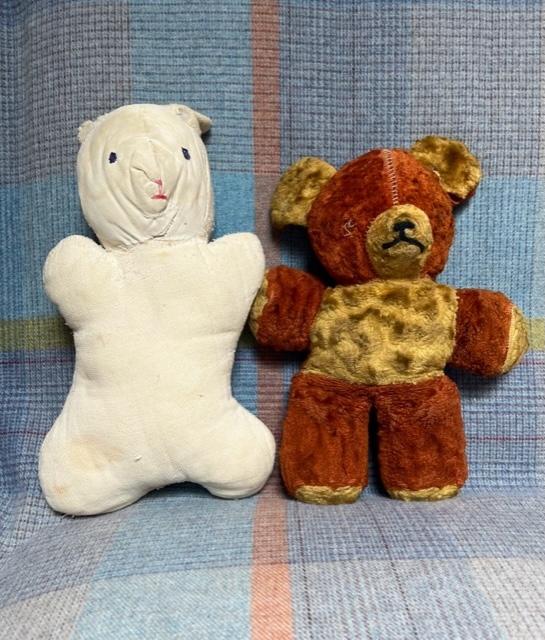
Posted on June 17, 2023
On a recent household purging binge, I came across some very old friends: my husband’s and my childhood teddy bears. Their well-worn look (and the fact that we still have them!) testifies to the important role they played when we were young children facing the challenges of new experiences. Whether it was sleeping alone in the dark, starting school, or something else that made us fearful, these transitional objects comforted us.
Just like children, we adults fear uncomfortable new experiences. But we are not as apt to admit our fears, at least not as openly as young children do. And as adults we’re more likely to view mistakes and failures with embarrassment and shame. We may limit challenges in an attempt to shield ourselves from fear and failure, confining ourselves to our comfort zone, the part of our life where things are familiar and anxiety is low, where we feel in control.
Without the stimulation of new experiences, though, we may become bored and stagnant and miss out on the chance to fulfill our potential. Without challenges, we don’t experience the neurological growth that contributes to brain health or build the confidence and resilience we need for times when life throws the unexpected our way.
Stepping outside the comfort zone is so beneficial that business and self-improvement literature abounds with recommendations that can be interpreted as suggesting we do this regularly so we are always growing and performing optimally. But there can be a cost to that.
When we leave our comfort zone, we enter what is often called the fear zone on our way to zones of experience where learning and growth take place. Feeling fearful automatically turns on our fight-or-flight mechanism, and our bodies fill with stress hormones. As helpful as this is on occasion, making a lifestyle of leaving our comfort zone can be harmful when stress that is chronic, rather than episodic, leads to exhaustion, burnout and damaging wear and tear on our bodies.
Instead of being on autopilot, we can choose when and how to leave our comfort zone so we get its benefits without these costs to our health. Here are some tips:
Be sure it’s important. When you want to try something new that will help you grow or change, ask yourself how it aligns with your personal values. Being clear on why you want to do this will help motivate you and move you past your fear.
Envision success. Picture yourself having already accomplished what you’re about to do. How do you feel? How has this achievement improved your life? What does it mean to you? Keep that picture in mind and revisit it often.
Set an appropriate goal. A goal that’s too easy will become boring, and one that’s too difficult can engender a feeling of inadequacy. The idea is to stretch yourself but not overreach. Think Goldilocks, remembering that you can modify your goal at any time.
Know your anxiety dose. Everyone is different: What terrifies one person excites another. Ask yourself how much anxiety you can tolerate and what’s too much.
Reframe stress. When fear arises as you leave your comfort zone, be aware of worry, of dwelling on mere possibilities that may never occur. Adding worry to stress creates anxiety. Instead of worrying, try to see stress as energizing you to do your best. See it as your ally in this situation, not your enemy.
Consider your strengths. You’ve probably left your comfort zone in some other areas of your life. Ask yourself what personal strengths helped you and how you could use those strengths again.
Examine your limiting beliefs. What do you believe you can and can’t do? Ask yourself where your limiting beliefs come from, whether they are true today and whether or not they are serving you.
Practice self-compassion. Show yourself the kindness you would show a family member or close friend going through this experience. Applaud small steps and remind yourself that progress is seldom perfectly linear. Use language that keeps possibility alive: “I’m not there yet, but I am becoming . . . “
Seek support. Enlist the help of a supportive friend, family member or coach. Snuggle with your teddy bear or childhood pillow or blanket if you want, or find another comforting object if it helps.
The reward for your efforts? An expanded comfort zone and newfound confidence and courage, which will help the next time you choose to challenge yourself as well as when life has plans of its own.